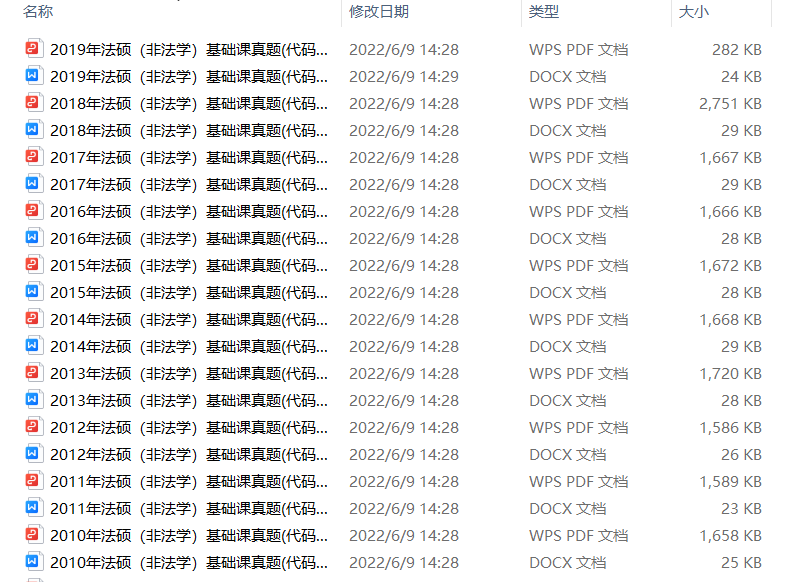特惠-26考研冲刺
特惠-27考研课
双证-在职硕士
免联考-同等学力
26考研-肖八笔记
26考研-时政刷题
26考研-作文押题
26考研-全套真题
26考研-提前估分
保研-路线图
27考研-智能择校
27考研-英语测评
27考研-新大纲对比
热门-计算机择校

扫码加入训练营
牢记核心词
学习得礼盒
考研的备考中,对于历年真题的复习,也是提升考试分数的重要方法。为了让大家更好的积累学习,小编为大家整理了历年考研真题,下面是关于“Of all the lessons taught by the financial crisis”,希望对大家有更好的帮助。
5、 Of all the lessons taught by the financial crisis, the most personal one has been that American aren't too slick with money. We take out home loans we can't afford. We run up sky-high credit card debt. We don't save nearly enough for the retirement. In response, proponents of financial-literacy education are stumping with renewed zeal. School districts in states such as New Jersey and Illinois are adding money-management courses to their curriculums. The Treasury and Education departments arc sending lesson plans to high schools and encouraging students to compete in the National Financial Capability Challenge that begins in March. Students with top scores on that exam will receive certificates - but chances for long term benefits are slim. As it tums out, there is little evidence that traditional efforts to boost financial know-how help students make better decisions outside the classroom. Even as the financial- literacy movement has gained steam over the past decade, scores have filling on tests that measure how informed students are about things such as budgeting, credit cards, insurance and investments. A survey of college students conducted for the JumpStart Coalition for Personal Financial Literacy found that students who'd had a personal-finance or money-management course in high school scored no better than those who hadn't. "We need to figure out how to do this in the right way, “says Lewis Mandell, a professor at the University of Washington who after 15 years of studying financial-literacy programs has come to the conclusion that current methods don't work. A growing number of researchers and educators agree that a more radical approach is needed. They advocate starting financial education a lot earlier than high school, putting real money and spending decisions into kids' hands and talking openly about the emotions and social influences tied to how we spend. One promising example of new thinking is found on Chicago's South Side. At the Ariel Community Academy, financial education starts in kindergarten with books like A Chair for My Mother (the moral: if you want to buy something, save money first) and quickly becomes hands- on. Each entering class at Ariel is entrusted with a $20,000 investment portfolio, and by seventh grade, kids are deciding what to buy and sell (profits help pay for college). Last year, for the first time, the eighth-grade class graduated with less than the original S20,000. Talk about a teachable moment: stocks don't always go up. Other initiatives are tackling such real-world issues as the commercial and social pressures that afflict purchasing decisions. Why exactly do you want those expensive name-brand sneakers so badly? "It takes confidence to take a stand and to think differently," says Jeroo Millimoria, founder of Aflatoun, a nonprofit whose curriculum, used in more than 30 countries, aims to help kids get a leg up in their financial lives. "This goes beyond money and savings. That approach might have helped in the recent housing bubble. Buyers didn't just need to know how different sorts of mortgages worked; they also needed the fortitude to choose a 30-year fixed rale when everyone around them was buying a bigger house with a riskier loan. Amid such a complicated landscape, some experts question whether there could ever be enough education to adequately prepare Americans for financial life. A better solution, these critics contend, is to reform the system. "What works is creating institutions that make it easy to do the right thing," says David Laibson, a Harvard economics professor who, like Mandell, has decided after years of research that education isn't a silver bullet. One idea being discussed in Washington is the automatic IRA. Employers would have to enroll each worker in a personal retirement-savings account unless that worker decided to opt out. Yet even the skeptics arc slow to write of" financial education completely. More than anything, they say, we need to rigorously study the financial decisions of alumni of programs like Ariel and Aflatoun and compare them with those of peers who didn't get the same sort of education. "Until you have experimental evidence, it's all a little speculative," says Michael Sherraden, a professor at Washington University in St. Louis who is conducting a seven-year, randomized, controlled study on whether giving children bank accounts inculcates the habit of saving - a program already being tried on a large scale in the U. K. Yes, good, solid research like this takes a lot of time and resources. But if what we're doing right now isn't working, it's in our own best interest to figure out what does.1. What are Americans supposed to do personally after the financial crisis?2. What is Lewis Mandell's feeling toward the current financial-literacy movement?3. According to the passage, the new kindergarten-entrance financial education is designed to4. According to some critics, a better way to ensure Americans to prepare for financial life is5. Which of the following adjectives best describes the author's treatment of the topic?
问题1
A、Make plans when assets are placed in investments options.
B、Prepare themselves with some money-management skills.
C、Try not to take economic security for granted.
D、Pay much more attention to their retirements.
问题2
A、The program benefits people in budgeting and investment.
B、The program has been ineffective in financial managing.
C、The program would cause psychological problems.
D、The program symbolizes an end to the financial crisis.
问题3
A、educate kids to manage money from the very beginning.
B、teach kids to recognize money from kindergarten.
C、prepare kids' education fees from the very beginning.
D、help kids to decide what to purchase and sell.
问题4
A、to compare two different systems.
B、to do experiments in virtual life.
C、to provide enough curriculums.
D、to set up new institutions.
问题5
A、Neutral.
B、Positive.
C、Negative.
D、Indifferent.
以上“Of all the lessons taught by the financial crisis”,更多关于考研真题内容将不断更新。
本文关键字:

 资料下载
资料下载
2014年-2025年考研历年真题汇总
发布时间:2024-04-25扫码添加【考研班主任】
即可领取资料包
考研大纲PDF电子版下载-历年(附解析)
发布时间:2024-04-25扫码添加【考研班主任】
即可领取资料包
2026年考研政数英备考资料zip压缩包
发布时间:2024-04-25扫码添加【考研班主任】
即可领取资料包
考研英语大纲词汇5500打印版(基础必备)
发布时间:2024-04-25扫码添加【考研班主任】
即可领取资料包
新东方在线考试模拟题【12套】
发布时间:2024-04-25扫码添加【考研班主任】
即可领取资料包
2026年考研专业课知识点总结
发布时间:2024-04-25扫码添加【考研班主任】
即可领取资料包
新东方考研资料下载地址
发布时间:2023-05-17新东方在线考研资料合集
下载方式:微信扫码,获取网盘链接

目录:
1.2013-2023年近10年政数英真题及解析PDF版(新东方)
2.2013-2023年专业课考试历年真题及解析PDF版
3.24考研复习备考资料大合集:大纲+备考资料+词汇书+考前押题+自命题
资料介绍:
1.2013-2023年近10年政数英真题及解析PDF版(新东方)
 、
、
2.2013-2023年专业课考试历年真题及解析PDF版


3.24考研复习备考资料大合集

3.24考研复习备考资料:考研大纲

3.24考研复习备考资料:政数英备考资料+自命题真题

------------------
考研备考过程中,尤其是专业课部分,参考往年的考试真题,对于我们的复习有更好的帮助。北京大学考研真题资料都有哪些?小编为大家进行了汇总。
北京大学考研真题资料-公共课

北京大学考研真题资料-专业课


以上就是关于“北京大学考研真题资料下载(历年汇总)”的整理,更多考研资料下载,请关注微信获取下载地址。
2024考研公共课必背知识点汇总
发布时间:2023-01-03扫码添加【考研班主任】
即可领取资料包
2013-2023考研历年真题汇总
发布时间:2023-01-03扫码添加【考研班主任】
即可领取资料包
考研英语大纲词汇(PDF可打印)
发布时间:2023-01-03扫码添加【考研班主任】
即可领取资料包
2024考研专业课知识点总结
发布时间:2023-01-03扫码添加【考研班主任】
即可领取资料包
2023考研政治 内部押题 PDF
发布时间:2022-11-16扫码添加【考研班主任】
即可领取资料包
徐涛:23考研预测六套卷
发布时间:2022-11-16扫码添加【考研班主任】
即可领取资料包
考研政数英冲刺资料最新整理
发布时间:2022-11-16扫码添加【考研班主任】
即可领取资料包
23考研答题卡模板打印版
发布时间:2022-11-16扫码添加【考研班主任】
即可领取资料包
2023考研大纲词汇5500PDF电子版
发布时间:2022-07-28扫码添加【考研班主任】
即可领取资料包
考研历年真题(公共课+专业课)
发布时间:2022-07-28扫码添加【考研班主任】
即可领取资料包
考研英语阅读100篇附解析及答案
发布时间:2022-01-07扫码添加【考研班主任】
即可领取资料包
新东方考研学霸笔记整理(打印版)
发布时间:2022-01-07扫码添加【考研班主任】
即可领取资料包
2001-2021年考研英语真题答案(可打印版)
发布时间:2022-01-07扫码添加【考研班主任】
即可领取资料包
考研英语词汇5500(完整版下载)
发布时间:2022-01-07扫码添加【考研班主任】
即可领取资料包
2022考研政审表模板精选10套
发布时间:2022-01-07扫码添加【考研班主任】
即可领取资料包
历年考研真题及答案 下载
发布时间:2021-12-09扫码添加【考研班主任】
即可领取资料包
考研政审表模板汇总
发布时间:2020-06-17扫码添加【考研班主任】
即可领取资料包
近5年考研英语真题汇总
发布时间:2020-06-17扫码添加【考研班主任】
即可领取资料包
考研英语大纲词汇5500
发布时间:2020-06-17扫码添加【考研班主任】
即可领取资料包
2022考研12大学科专业排名汇总
发布时间:2019-11-21扫码添加【考研班主任】
即可领取资料包
2023考研政治复习备考资料【珍藏版】
发布时间:2019-11-21扫码添加【考研班主任】
即可领取资料包
考研英语万能模板+必备词汇+范文
发布时间:2019-11-21扫码添加【考研班主任】
即可领取资料包
考研数学一、二、三历年真题整理
发布时间:2019-11-21扫码添加【考研班主任】
即可领取资料包

添加班主任领资料
添加考研班主任
免费领取考研历年真题等复习干货资料

 推荐阅读
推荐阅读
考研的备考中,对于历年真题的复习,也是提升考试分数的重要方法。为了让大家更好的积累学习,小编为大家整理了历年考研真题,下面是关
来源 : 网络 2025-06-09 07:06:00 关键字 :
考研的备考中,对于历年真题的复习,也是提升考试分数的重要方法。为了让大家更好的积累学习,小编为大家整理了历年考研真题,下面是关
来源 : 网络 2025-06-11 07:07:00 关键字 :
考研的备考中,对于历年真题的复习,也是提升考试分数的重要方法。为了让大家更好的积累学习,小编为大家整理了历年考研真题,下面是关
来源 : 网络 2025-06-11 07:07:00 关键字 :
考研的备考中,对于历年真题的复习,也是提升考试分数的重要方法。为了让大家更好的积累学习,小编为大家整理了历年考研真题,下面是关
来源 : 网络 2025-06-11 07:07:00 关键字 :
考研的备考中,对于历年真题的复习,也是提升考试分数的重要方法。为了让大家更好的积累学习,小编为大家整理了历年考研真题,下面是关
来源 : 网络 2025-06-11 07:07:00 关键字 :

 资料下载
资料下载
扫码添加【考研班主任】
即可领取资料包
扫码添加【考研班主任】
即可领取资料包
扫码添加【考研班主任】
即可领取资料包
扫码添加【考研班主任】
即可领取资料包
扫码添加【考研班主任】
即可领取资料包
扫码添加【考研班主任】
即可领取资料包
新东方在线考研资料合集
下载方式:微信扫码,获取网盘链接

目录:
1.2013-2023年近10年政数英真题及解析PDF版(新东方)
2.2013-2023年专业课考试历年真题及解析PDF版
3.24考研复习备考资料大合集:大纲+备考资料+词汇书+考前押题+自命题
资料介绍:
1.2013-2023年近10年政数英真题及解析PDF版(新东方)
 、
、
2.2013-2023年专业课考试历年真题及解析PDF版


3.24考研复习备考资料大合集

3.24考研复习备考资料:考研大纲

3.24考研复习备考资料:政数英备考资料+自命题真题

------------------
考研备考过程中,尤其是专业课部分,参考往年的考试真题,对于我们的复习有更好的帮助。北京大学考研真题资料都有哪些?小编为大家进行了汇总。
北京大学考研真题资料-公共课

北京大学考研真题资料-专业课


以上就是关于“北京大学考研真题资料下载(历年汇总)”的整理,更多考研资料下载,请关注微信获取下载地址。
扫码添加【考研班主任】
即可领取资料包
扫码添加【考研班主任】
即可领取资料包
扫码添加【考研班主任】
即可领取资料包
扫码添加【考研班主任】
即可领取资料包
扫码添加【考研班主任】
即可领取资料包
扫码添加【考研班主任】
即可领取资料包
扫码添加【考研班主任】
即可领取资料包
扫码添加【考研班主任】
即可领取资料包
扫码添加【考研班主任】
即可领取资料包
扫码添加【考研班主任】
即可领取资料包
扫码添加【考研班主任】
即可领取资料包
扫码添加【考研班主任】
即可领取资料包
扫码添加【考研班主任】
即可领取资料包
扫码添加【考研班主任】
即可领取资料包
扫码添加【考研班主任】
即可领取资料包
扫码添加【考研班主任】
即可领取资料包
扫码添加【考研班主任】
即可领取资料包
扫码添加【考研班主任】
即可领取资料包
扫码添加【考研班主任】
即可领取资料包
扫码添加【考研班主任】
即可领取资料包
扫码添加【考研班主任】
即可领取资料包
扫码添加【考研班主任】
即可领取资料包
扫码添加【考研班主任】
即可领取资料包

 阅读排行榜
阅读排行榜
 相关内容
相关内容